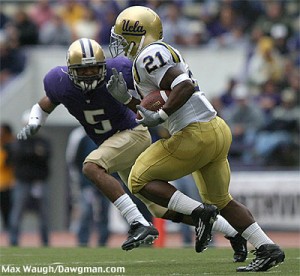Would that be fair? I would hope that some of those writers who argued in favor of reducing rookie contracts would find such a result unjust, as a talented, star player should be rewarded with a big contract. [1]This is obviously shtick, but I do find it hypocritical for owners to argue against paying “unproven” players and then to argue against paying aging players who “have little … Continue reading But even if he performs well in 2012 and 2013, by 2014, Jones-Drew would be a 29-year-old runner who had just endured five years of punishment as a workhorse running back. No team would sign him to a large contract at that point, as he could not be expected to continue to produce at such a high level.
When it comes to running backs, it is understood that they must try to maximize their salaries when they are young, as big paydays for older runners are few and far between. But in this situation, some have argued that since this is Jones-Drew’s second contract, he should honor his deal (or, alternatively, that we should be less sympathetic to his cause). In 2009, Jones-Drew signed his second contract, and the argument goes that unlike a rookie contract — where players have almost no leverage — Jones-Drew already had his bite at the apple. But that argument ignores the fact that Jones-Drew’s rookie contract remains part of his current predicament.
[continue reading…]
References
| ↑1 | This is obviously shtick, but I do find it hypocritical for owners to argue against paying “unproven” players and then to argue against paying aging players who “have little left” in the tank. Players should be paid for what we expect them to produce, and the “unrpoven” argument is and always has been a red herring. |
|---|

